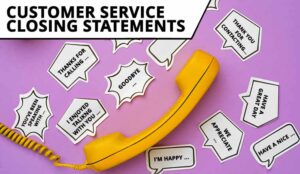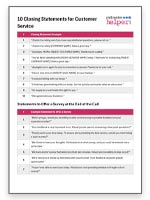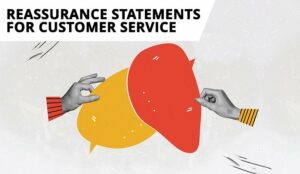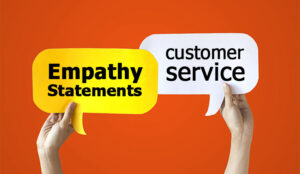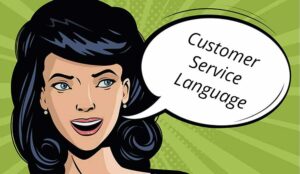Looking for some great closing spiel and advice for your call centre agents?
Here’s a round-up of some of the best closing spiel, statements, and phrases for your call scripts – as well as some handy hints too.
What Are Call-Closing Statements?
Call-closing statements refer to specific words and phrases that a customer service agent or salesperson will use to signal to the customer that it’s time to finish up the conversation.
These statements help ensure the interaction ends smoothly and professionally while leaving the customer with a positive impression.
They often include expressions of gratitude, confirmations that all concerns have been addressed, or reassurances about any next steps. A well-crafted closing statement can also reduce the likelihood of follow-up calls by ensuring clarity and resolution.
Why Is It Important to Close a Call Professionally?
Closing every call professionally helps your company provide great customer service in a more consistent and polished manner.
A well-executed closing reassures the customer that their concerns have been fully addressed, leaving them with a sense of confidence in your service.
It can improve customer satisfaction and create a positive lasting impression, ensuring that the conversation ends on a high note. This, in turn, helps create customer loyalty, encourages repeat business, and enhances brand reputation.
The Best Call-Closing Statements For Call Centre Agents – With Examples
When it comes to ending a call, here are some phrases that offer a polite way to close:
1. “Thanks for Calling and if You Have Any Additional Questions, Please Call Us.”
This is a great example of closing spiel in the call centre, as it reassures the customer of future support (should they need it) and is a nice gesture of the advisor’s willingness to make the customer’s life easier.
Offering this reassurance is something that this statement does well, as no matter the stage of the call, it is always good practice for an advisor to signal to the customer that they are valued and can be supported.
This could also be a particularly good phrase to use if the customer has been given a lot of information or is rushing through the call because they are in a hurry.
2. “Thanks For Calling [COMPANY NAME]. Have a Good Day.”
“Thanks for calling” is a popular closing statement. Perhaps this shows the value of keeping the tone of the conversation less formal by using “thanks” and not “thank you”.
Using these shortened terms to sound more human contrasts with the robotic, script-led impressions many customers have of contact centres and encourages more natural communication.
3. “Goodbye, Mr/Mrs [INSERT CUSTOMER NAME], Thank You For Calling.”
This is a nice call-closing phrase to use if your contact centre is looking for advisors to do more to personalize their calls.
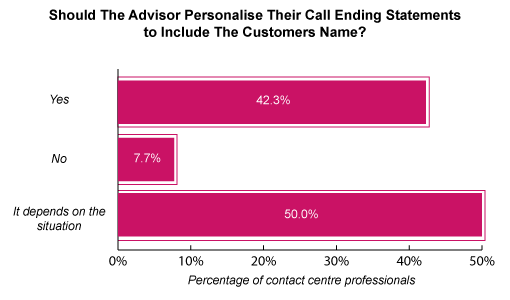
However, the decision to use Mr/Mrs X or the customer’s first name is a difficult one, as it is important to address the customer in the appropriate manner.
While some customers may prefer Mr/Mrs, many industry professionals believe using the customer’s first name is a shortcut to building rapport.
So, if an advisor believes that the customer has a preference, it is good practice to record that in the CRM system, so future advisors know which to use.
Either way, many contact centre professionals believe that advisors should personalize their ending spiel by addressing the customer by their name, as highlighted in the chart.
If you want to know alternative ways to address callers, read our article: How Should We Address Callers?
4. “You’ve Been Speaking With [INSERT ADVISOR NAME] Today. Thank You For Contacting [INSERT COMPANY NAME]! Have a Great Day.”
This may be quite a long call-ending statement to close a call, but it definitely covers all the bases in terms of using the customer’s name, thanking them for their time, and wishing them well.
Also, in amongst this phrase is reference to the company’s name, which could be good to include if the interaction has gone well. Why? Because it reinforces that this good experience was delivered by the company and not just a helpful advisor.
5. “Apologies Once Again For The Inconvenience Caused. Thank You For Your Call.”
When closing a call, using some of the other statements included in this list may not be appropriate if the call hasn’t gone well.
For example, saying something like “I enjoyed talking to you” would not be the best thing to say to an abusive customer.
However, the above statement is a short and to-the-point example of closing spiel for the call centre, as it does a good job of addressing the issue and taking ownership of it on behalf of the organization.
If you are looking for more information on customer service apologies, read our article: “Sorry for the Inconvenience” – How to Offer a Genuine Apology
When we quizzed a group of almost 30 contact centre professionals, over half agreed that each step was vital when closing a call. This is highlighted in the chart below.
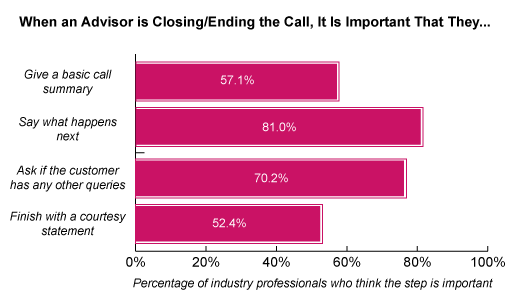
Note, percentages add up to over 100% because multiple responses were allowed.
6. “Have a Nice Time in [INSERT PLACE NAME] on Your Holiday.”
Some of the best closing spiel for customer service can only be used sparingly – depending on the situation. That’s why using a phrase like this will depend on the small talk that went on over the course of the conversation.
(Of course, advisors can try to bring this topic up more consistently during small talk and rapport building if they would like a springboard into this simple closing remark.)
Some of the best closing spiel for customer service can only be used sparingly – depending on the situation.
This technique can also extend beyond the topic of holidays, as Melvyn Griffiths, one of our readers, says: “Ideally, the call should lead the way for a more relaxed ending, whereby the call ends with the advisor commenting on something the customer has mentioned during the call…”
Dee Chapman is also an advocate of using phrases like this, giving the example of a customer who said they were in the process of moving to a new house.
In this situation, Dee would recommend the statement: “Thank you for calling us at this busy time and good luck with your move. I hope everything goes well.”
By using a statement of this nature, the advisor is personalizing the call and building on any rapport that had been created over the course of the interaction.
7. “I Enjoyed Talking With You Today.”
Why not leave the customer feeling great that they made the call? As Dee says: “Try and commend or praise the customer. When they are made to feel great, they tend to give positive results when surveyed or an evaluation is sent to them.”
You can see more examples of ways to compliment customers in our article: 150 Great Complimentary Words and Phrases to Use in Customer Service
8. “It Has Been Great Talking With You Today. Let Me Quickly Summarise What We Discussed.”
This is a great way to quickly recap on what has been discussed, so the customer feels reassured that everything has been taken care of as they put the phone down.
9. “I’m Happy We Could Make this Right For You.”
By ending the call with “I’m Happy We Could Make This Right For You”, the agent wraps the call up on a really positive note – reconfirming that the problem has been resolved and that they were more than happy to assist.
10. “We Appreciate Your Business.”
As short and sharp as this may be, it gets the job done. While the use of the word “we” may sound a little corporate – as some contact centres would prefer advisors to use statements that include pronouns such as “I” and “you” – these short signing-off phrases are commonly used.
Advisors could also try “Thank you for shopping with [INSERT COMPANY NAME].”
Printable – 10 Closing Statements for Customer Service
Do you want to download this to share with your team?
Get your free download of 10 Closing Statements for Customer Service now:
How to Offer a Survey at the End of a Call
Using the right phrases to offer a survey at the end of a call can make a significant difference in the customer’s willingness to participate.
Here are some effective phrases a call centre agent can use:
- “Before you go, would you be willing to take a short survey to provide feedback on your experience today?”
- “Your feedback is very important to us. Would you be open to answering a few quick questions?”
- “Thank you for your time today. To ensure we’re providing the best service, would you mind taking a quick survey?”
- “We’d love to hear your thoughts. Participate in a short survey, and you could be entered into a prize draw.”
- “We have a short survey that takes less than two minutes. Would you be willing to help us out?”
- “We’ll send you a follow-up text/email with a survey link. Your feedback would be greatly appreciated.”
- “I hope I was able to assist you today. Would you mind providing feedback through a short survey?”
How to Recap in a Call Centre
End the Call With the Customer Saying “Yes” Instead of “No”
Here’s a brilliant example of a small tweak that can result in each call wrapping up with a positive affirmation – instead of a negative one – as explained by Babs Crane, Behavioural Science Consultant (Consumer Psychologist) at Mind The Humans:
“There is a tendency in many call centres for the agent to ask, ‘is there anything else I can help you with today?’ and for the customer to say ‘no’.
“However, a slight tweak to this and for the agent to ask ‘have I answered everything for you today?’ will prompt the customer to say ‘yes, you have’, which is a more positive conclusion to the call.”
Let the Customer Know What Happens Next
Not all customer issues can be resolved by the end of the first phone call. Rather, some issues require a follow-up call.
By reiterating what the next steps are to the customer, you’re showing them that you have the situation in hand – even if the resolution takes a few extra steps.
The Don’t Worry Strategy
This closing strategy uses basic human psychology to help alleviate your customer’s concerns by letting them know that others that have had the same experience.
For example, “Don’t worry, most of my customers find that…”
Recap – A 4-Step Process
Generally, the best way to think about closing the call is with a four-step process, as provided by Dee Chapman, a Programme Support Manager at The Forum:
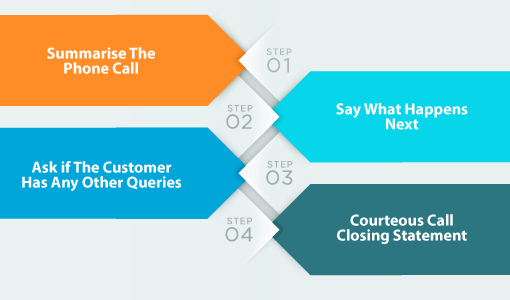
- STEP 1 – Briefly summarize what has been accomplished on the call.
- STEP 2 – Let the customer know what happens next (and include a timescale – so they can go about planning their busy lives).
- STEP 3 – Ask the customer if there is anything else that they need help with.
- STEP 4 – Finish with a courteous call-closing statement.
Don’t Just Stick to Just One Statement!

Also avoid using one call-closing courtesy statement at the end of each interaction.
According to Dee, these statements do “not work as well, because they don’t always fit the personal conversation the advisor will have had with that customer. They sound robotic and generic.”
For example, Keiron, one of our readers, says: “When you have had a difficult customer who cannot be helped for whatever reason, it is not helpful to end the call with ‘is there anything else that I can help with?’.”
Above All, Stay Upbeat
However, in most cases when advisors are closing the call, it is nice to stay upbeat and use an enthusiastic tone.
This is critically important, as Dee concludes: “The energy an advisor displays on a call is transferable and the customer will end the call feeling that they have had a memorable experience and that they are special.”
For more statements that can really add value to your calls, read our articles:
- 27 Positive Statements to Use In Difficult Situations
- Best Tips, Phrases and Words to Use for Building Rapport
- Top 25 Positive Words, Phrases and Empathy Statements
Author: Megan Jones
Reviewed by: Robyn Coppell
Published On: 14th Jul 2023 - Last modified: 28th Jan 2025
Read more about - Customer Service Strategy, Downloads, Editor's Picks, Language, Positive words, Printable, Rapport, The Forum





